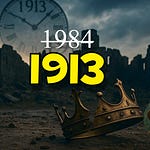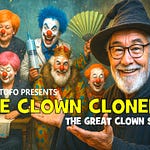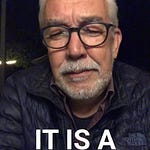Once upon a time there was a man named Captain Charles Kork. Although he had no ship, people called him “Captain” because he took charge of something far more powerful than a fleet: the health of humankind. Charles was a beloved nutritionist. He spoke with sparkling eyes and a voice like honey—warm, reassuring, yet determined.
He had discovered a great secret: far away lay a mysterious country called Gastrovia, which flooded the world with tempting packaged foods. Everything looked beautiful, with shiny labels and bright colors, even for children, but whoever ate them became slowly sick and weak. People grew slower, gloomier, and children had less and less energy to play.
Charles spoke about this on television. He showed charts, spoke of hidden sugars, fake fats, and sly substances with names that sounded like spells from a dark grimoire. People loved him, and even the president called him “the sentinel of our stomachs.”
One springlike morning, Ray, a clever boy with an old camera around his neck, sat in front of the television. He loved everything about nutrition and saw Charles Kork as his great hero. Charles stood on a square, surrounded by flags and flowers. He spoke to a crowd that listened breathlessly.
But then it happened.
A sharp sound cut through the air—and Captain Charles Kork fell backward. People screamed, flags dropped, birds scattered. The news said it was an assassination, life on television. Ray froze. His camera dangled, motionless.
But something gnawed at him. Ray had an eye for details. Later, when he watched the footage frame by frame, he saw something strange.
A split second before the shot, Charles’s white shirt suddenly turned yellow, as if sunlight had shot through it. His hair popped off his head like a loose wig—and then returned as if time itself had rewound.
“That’s impossible,” whispered Ray. “That’s… not human.”
And then it struck him: it had to be a hologram.
The world mourned, but Ray stayed silent. Who would believe him? Charles Kork became a symbol, a martyr of healthy food. Statues rose, schoolbooks carried his name. But Ray kept thinking about that one frame, that yellow shirt, that returning hair.
He graduated, traveled the world as a photographer and videographer. He captured deserts, mountains, children laughing in sunlight. But deep inside, the question burned: Is Charles still alive?
One day, years later, Ray walked barefoot across the warm sand of a distant country. The air smelled of sea and coconut. He saw a small food shop with wooden shutters and a sign that read: Food for Life.
Curious, he stepped inside. The air was cool, filled with the scent of herbs and the soft hum of an old fan. Behind the counter stood a man with a calm smile, a white linen shirt, and a straw hat.
Ray looked up… and his heart stopped.
It was Charles.
Or someone who looked exactly like him: the same sparkling eyes, the same warm smile, a bit grayer perhaps, but unmistakably him.
“Can I help you?” the man asked kindly.
Ray wanted to shout, to ask, to scream even, but his voice wouldn’t come. He bought a bag of dates and left the shop without a word. Outside, the sun burned on his back while storms raged inside his mind.
That evening, Ray sat on the beach. In the distance he saw the man from the shop walking through the sand, a lantern in his hand, heading for a small boat bobbing gently on the waves. He stepped in, looked back—and smiled, straight at Ray. For a moment Ray thought he saw a wink.
Then the boat drifted away, soundless, toward the horizon.
Ray smiled back.
He told no one, because some truths are too precious to break apart with words.
And somewhere, deep in his heart, he knew:
Captain Charles Kork was alive.
And maybe, just maybe, he was still quietly guarding the health of the world.











